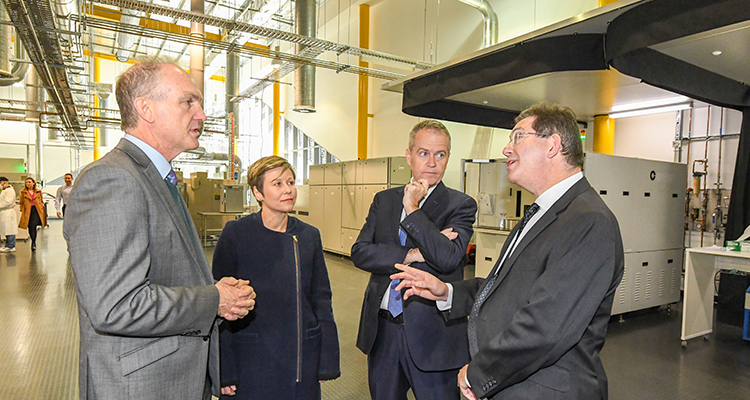
The development of silicon solar cell technologies at UNSW’s Solar Industrial Research Facility is creating a ‘Southern Hemisphere version of Silicon Valley’, Opposition Leader Bill Shorten said.
Australians will have greater access to cheap and sustainable renewable energy thanks to the research being undertaken at UNSW’s Solar Industrial Research Facility (SIRF), Opposition Leader Bill Shorten says.
Mr Shorten, along with Labor Senator for NSW Jenny McAllister, toured the facility with UNSW President and Vice-Chancellor Professor Ian Jacobs and the acting Head of the School of Photovoltaic and Renewable Energy Engineering, Associate Professor Alistair Sproul on Wednesday.
The tour took place as debate intensified around the federal government’s proposal for Australia's energy policy, the National Energy Guarantee (NEG).
The world-class manufacturing facility enables the development of UNSW’s silicon solar cell technologies from laboratory processes to factory-ready industrial processes.
Mr Shorten commended researchers at SIRF for creating what he described as the “Southern Hemisphere version of Silicon Valley”, saying their work is crucial to addressing Australia’s need for cheap, renewable energy.
“Some of the remarkable things we’re seeing researched here - it means that solar rooftop is about a third of the normal electricity grid price that people are paying now. That is what solar can do.”
The current design of the government’s energy policy will stifle future investment in renewable energy and facilities such as SIRF, Mr Shorten warned.
“That will lead to higher prices because renewable energy is where we’re going to see cheaper energy in the future,” he said.
SIRF is uniquely placed to meet Australia’s increasingly urgent quest for cheaper, sustainable energy, Professor Jacobs said.
“It brings together our very best researchers at UNSW with industry partners to push forward on this extraordinarily important area of research and its application.
“There is a need in Australia to keep investing in this sort of great research, in solar, in renewable energy and in so many other areas. It is the cornerstone of a prosperous and successful society,” he said.
Mr Shorten also praised UNSW’s commitment to being energy carbon neutral, with 100% of its power needs supplied by solar photovoltaics (PV) by 2020.
“The University of NSW is not just a suburban house or a small business, it’s one of the major users of electricity in this part of Sydney,” he said.
“If the University of NSW can see the commercial value in going to renewable energy then what we need is a government in Canberra who’s going to back the future, back the science and back lower energy prices.”
The 15-year Solar PV Corporate Power Purchase Agreement (Solar PPA) UNSW has in place with Maoneng is the first of its kind in Australia, and UNSW believes it is the first university in the world to go fully energy carbon neutral via solar photovoltaics.
- Log in to post comments
